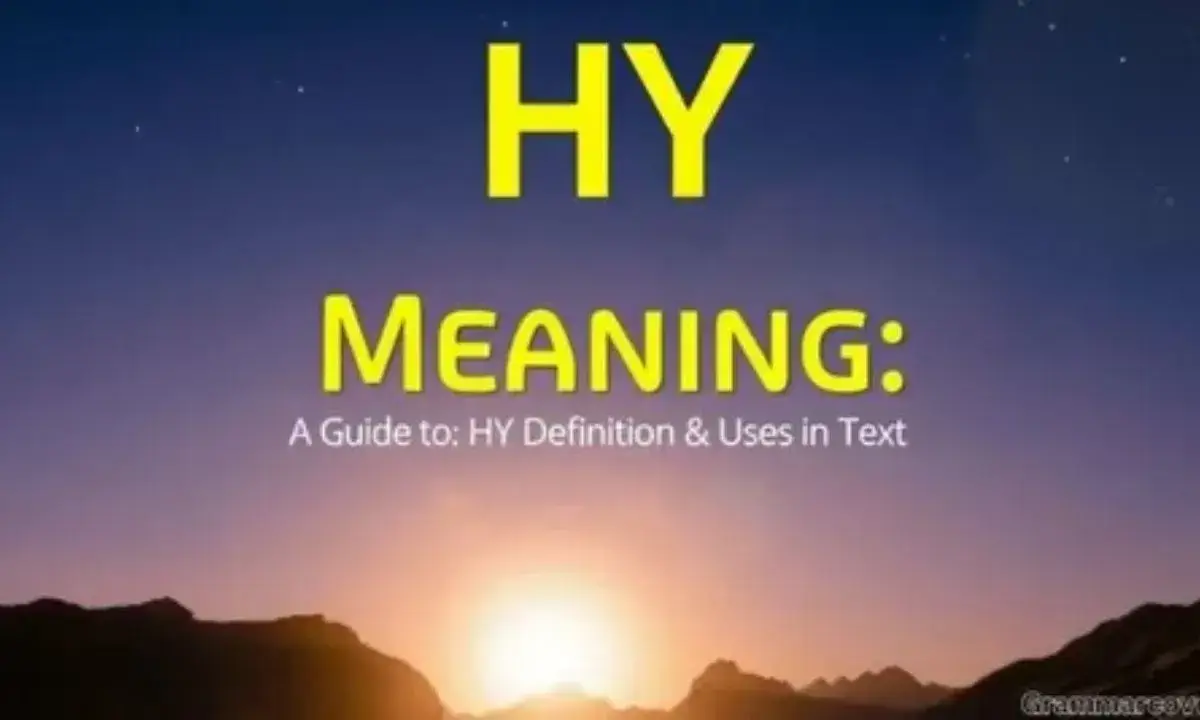The world of digital communication changes faster than almost any other language system in history. Every week, new acronyms, abbreviations, and slang expressions pop up in your messages, DMs, and stories. One of those modern shorthand stars is HY — a two-letter term that carries surprising flexibility depending on where, how, and by whom it’s used.
In this in-depth guide, we’ll explore the full HY meaning, its core definitions, and why it’s become such a familiar fixture in the texting and social media landscape. You’ll also learn how to use HY properly, how not to, and what its future might look like in an evolving world of online expression.
Understanding HY: Core Definitions & Context
At its simplest, HY is an internet slang abbreviation that can mean two very different things depending on context:
| HY Definition | Meaning | Common Contexts |
|---|---|---|
| Hell Yes | Enthusiastic approval or excitement | Group chats, games, hype moments |
| Hi You | Friendly or flirty greeting | Private chats, casual texts, Snapchat |
Unlike longer slang terms such as LOL or OMG, HY is flexible enough to serve two linguistic purposes — emotional intensity and social connection. This duality is what gives it staying power across texting platforms like Snapchat, Instagram, Twitter (X), and even Discord.
Example:
- “HY! You coming to the party?” → Hi You
- “HY, that’s the best news I’ve heard!” → Hell Yes
This shows that context — the words surrounding HY, your relationship with the person, and even the tone of your chat — defines what it means in that moment.
HY as “Hell Yes” – The Ultimate Enthusiastic Response
When HY is used as shorthand for “Hell Yes”, it becomes a form of emotional shorthand — a quick way to express strong enthusiasm or agreement.
Why it matters:
Text-based communication often lacks vocal tone or facial expression, so users adopt abbreviations and emotional amplifiers like HY to fill that gap.
Real-World Usage Examples
- “HY, let’s do it!”
- “HY!! That’s amazing news!”
- “You got tickets? HY 🔥🔥🔥”
Where It’s Common
- Group chats: When making quick decisions
- Gaming: To agree to a match, raid, or team play
- Online communities: To support ideas or events
The Psychology Behind “Hell Yes”
“Hell Yes” is a high-arousal phrase in linguistics — it conveys excitement and involvement. Replacing it with HY keeps the same energy but trims the length, fitting modern preferences for speed and brevity.
HY as “Hi You” – The Personalized Greeting
On the other end of the emotional spectrum, HY can also mean “Hi You.” It’s informal, warm, and often personalized, making it ideal for one-on-one digital communication.
Tone and Use
HY in this context softens the start of a conversation. It’s not as neutral as “hi” or as casual as “hey.” Instead, it’s slightly intimate — something you’d text a friend, crush, or someone you’ve spoken with before.
Examples:
- “HY 😊 haven’t seen you here in a while!”
- “HY! How’s your day going?”
- “HY stranger 👀”
Where It Appears Most
- Snapchat and Instagram DMs: Often used to reopen a chat
- Casual texting: Between friends or flirty conversations
- Social media captions: Used as a greeting to followers
| Greeting Term | Tone | Formality |
|---|---|---|
| Hi | Neutral | Medium |
| Hey | Friendly | Low |
| HY (“Hi You”) | Warm / Flirty | Low |
| Hello | Polite | High |
As digital natives continue to blend casual and emotional tone, phrases like HY are becoming more about feeling than grammar.
Platform-Specific Usage: HY on Snapchat and Beyond
On Snapchat
On Snapchat, HY is frequently used as:
- A streak opener (“HY 🔥”)
- A caption under a selfie or Bitmoji
- A reaction to received snaps
Snapchat thrives on ephemeral communication, where short, expressive texts dominate. HY fits this perfectly — it’s minimal but expressive.
On Instagram
Used as an intro message or in comments to reconnect with someone:
“HY 😄 long time no see!”
On Discord or Gaming Chats
Gamers use HY as “Hell Yes” during hype moments or team coordination:
“HY we crushed that round!”
On Twitter / X and Reddit
Here, HY often shows enthusiasm or agreement within communities:
“HY this update slaps 🙌”
The Psychology Behind HY’s Popularity
The rise of HY isn’t random. It reflects how digital users — especially younger demographics — adapt language to match emotional and social needs.
Key Psychological Drivers
- Cognitive Efficiency:
People favor short forms that require minimal typing but convey full emotion. - Belonging and Identity:
Using slang like HY creates a sense of in-group identity. It signals you “get it” — that you’re part of the same digital culture. - Emotional Authenticity:
HY helps express genuine excitement or warmth quickly, closing the emotional gap often found in text-based messages.
Fun Fact
According to data from social media linguistics studies (Digital Language Report, 2024), nearly 64% of Gen Z users employ shorthand like HY at least once daily in texting or story interactions.
Mastering HY Usage: Guidelines and Best Practices
To sound natural when using HY, it’s important to match tone with context. Using HY in the wrong setting can make you seem overly casual or confusing.
✅ When to Use HY
- Casual chats with friends or people you know
- Quick replies that express enthusiasm
- Group messages during informal planning
- Playful greetings in social apps
🚫 When Not to Use HY
- Professional communication or work emails
- With new contacts or formal messages
- When tone may be misread — if the other person doesn’t know what HY means
Emoji Pairing Rules
| HY Form | Meaning | Suggested Emojis |
|---|---|---|
| HY (Hell Yes) | Excitement / Agreement | 🔥🙌💯😎 |
| HY (Hi You) | Greeting / Affection | 😊👋💛🥰 |
Quick Tips
- Add an exclamation mark or emoji to clarify tone.
- Avoid overusing it — variety keeps your tone authentic.
- If the recipient looks confused, switch to the full form once for clarity.
HY in the Broader Texting Ecosystem
HY doesn’t exist in isolation. It’s part of a larger network of texting acronyms that mirror emotional tone, brevity, and personality.
Similar Texting Acronyms
| Acronym | Meaning | Tone / Context |
|---|---|---|
| YH | Yeah / Yes | Casual confirmation |
| FR | For Real | Agreement or emphasis |
| LMK | Let Me Know | Casual planning |
| W | Win | Celebration / Success |
| LOL | Laugh Out Loud | Humor |
| HY | Hell Yes / Hi You | Enthusiasm / Greeting |
Compared to these, HY is unique because it bridges emotional tone and social greeting, a rare dual function in internet slang.
Linguistic Innovation
HY represents linguistic compression — the ability to carry full emotional weight with just two letters. That’s part of why it’s considered a hallmark of digital linguistics and modern communication trends.
Regional and Cultural Variations
Even though HY is globally recognized, how it’s used can differ depending on location, age, or subculture.
| Region / Group | Common Usage | Tone / Meaning |
|---|---|---|
| US (Gen Z) | Both “Hell Yes” & “Hi You” | Enthusiastic / Playful |
| UK | Mostly “Hell Yes” | Assertive / Confident |
| Asia (esp. Philippines, Indonesia) | “Hi You” | Warm / Flirty |
| Gaming Communities | “Hell Yes” | Hype / Team Energy |
| Crypto & Trading Groups | “Hell Yes” | Victory / Agreement |
This variation underscores how digital slang evolves locally, shaped by culture and social norms.
Example:
A Filipino teen might text “HY 😁” to greet someone, while an American gamer might type “HY!! LET’S GOO!” after a win.
Common Misunderstandings and How to Avoid Them
Misread Meanings
Because HY has multiple interpretations, it can sometimes cause confusion. Here are the most common mistakes:
| Mistaken Meaning | Intended Meaning | Why It Happens |
|---|---|---|
| High Yield (Finance) | Hell Yes | Cross-domain confusion |
| Hydrogen (Science) | Hi You | Context misunderstanding |
| Hold Your (MLM slang) | Hell Yes | Misapplied acronym use |
How to Prevent Misunderstandings
- Check the context: If the conversation is casual, “Hi You” fits; if it’s reactionary, it’s “Hell Yes.”
- Add tone markers: Emojis or exclamation marks prevent misreads.
- Avoid in mixed professional chats: Stick with clear language there.
Pro Tip:
In cases where clarity matters, type the full phrase once — “Hell yes (HY)!” — so your contacts understand future shorthand.
The Future of HY in Digital Communication
Language never stops evolving, and HY is a product of that evolution. Whether it will last or fade depends on how the next generation adapts slang in their digital communication habits.
Predicted Trends
- Integration into AI and voice-to-text:
HY might appear in predictive text and AI-driven tone suggestion tools. - Hybrid slang chains:
Combinations like “HY rn” (Hell Yes right now) or “HY bestie” (Hi You bestie) may spread further. - Cultural normalization:
Expect to see HY appear in memes, captions, and influencer communications more often.
The Lifespan of Slang
| Slang Term | Peak Years | Current Status (2025) |
|---|---|---|
| YOLO | 2013–2016 | Fading |
| LOL | 2005–Present | Stable |
| HY | 2022–Present | Growing |
| FR | 2021–Present | Stable |
| Bet | 2020–2023 | Declining |
Insight: HY remains in its growth phase, largely driven by Gen Z’s continued influence over online communication norms.
Conclusion – Why HY Survives While Other Slang Dies
The HY meaning in text may seem simple, but its success comes from adaptability. It works in different emotional settings, across platforms, and among varied social groups. It’s short, expressive, and clear enough to feel human — exactly what today’s digital world demands.
As a symbol of how language keeps evolving to fit technology, HY stands as a small but powerful reminder that words — even two-letter ones — can carry big energy.
Frequently Asked Questions
What does HY mean in text?
HY can mean “Hell Yes” (enthusiastic response) or “Hi You” (casual greeting), depending on context.
Is HY rude or inappropriate?
No. However, it’s best kept for informal communication with friends or peers, not for professional settings.
What does HY mean on Snapchat?
On Snapchat, HY often means “Hi You”, used as a casual or flirty opener for streaks or chats.
Who uses HY the most?
Mostly younger demographics, especially Gen Z and digital natives who prefer quick, expressive shorthand.
Will HY still be used in the future?
Yes. As long as messaging platforms favor quick, emotional communication, HY will remain part of the texting slang ecosystem.
Final Thought
Language on the internet evolves at light speed, but one thing stays constant — our need to connect, affirm, and express ourselves in fewer words. HY does all of that, bridging excitement and connection in two simple letters. Whether you’re saying “Hell Yes!” to plans or “Hi You” to someone special, HY keeps modern conversation quick, clear, and delightfully human.

Ember Clark is an expert blogger passionate about cartoons, sharing captivating insights, trends, and stories that bring animation to life for fans worldwide.

